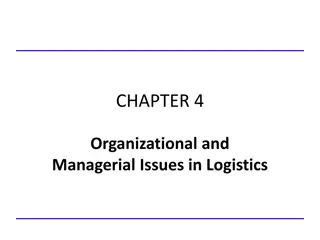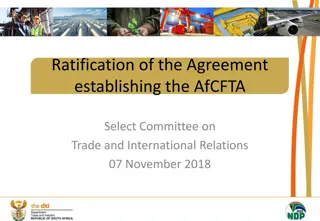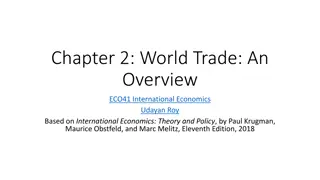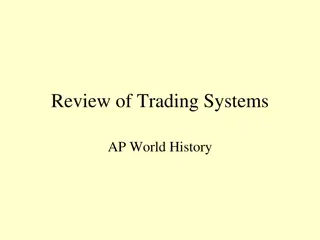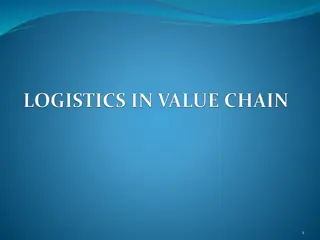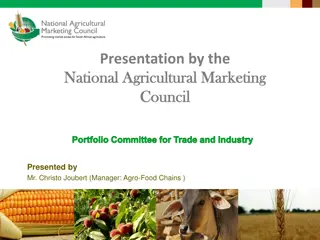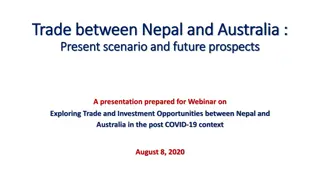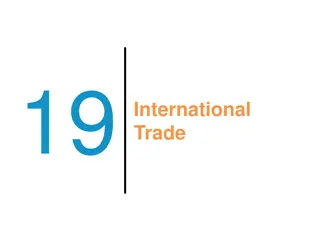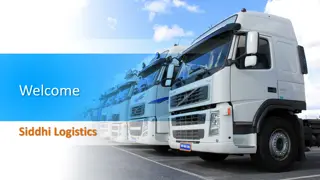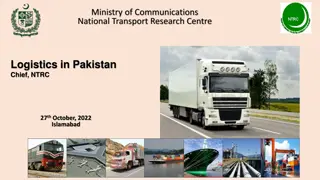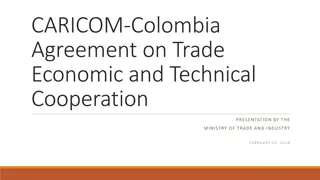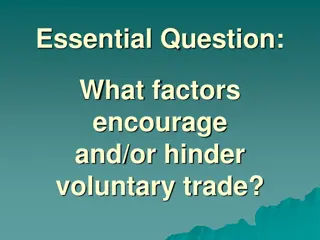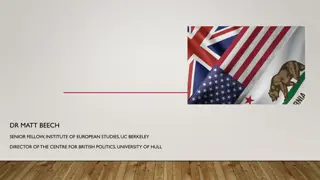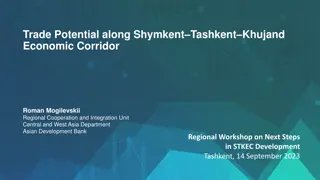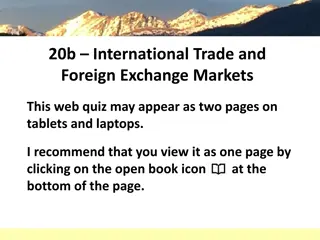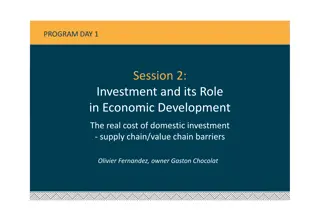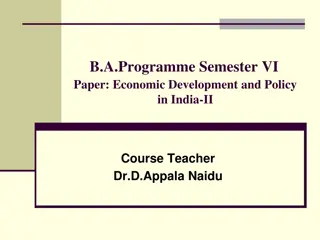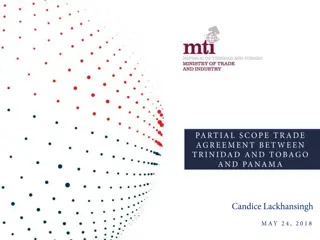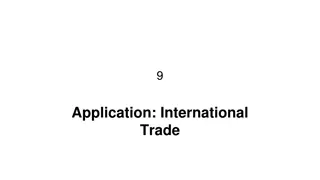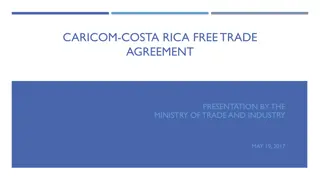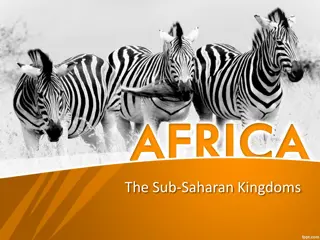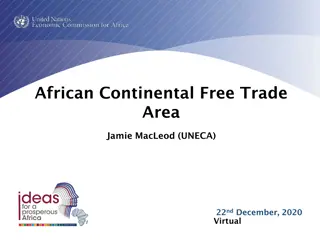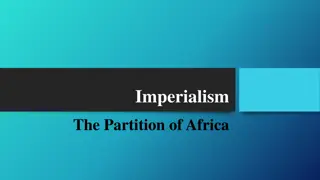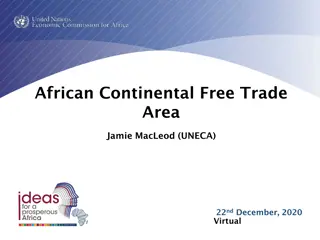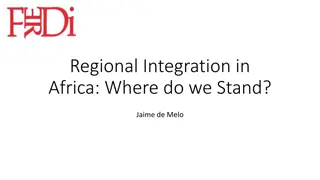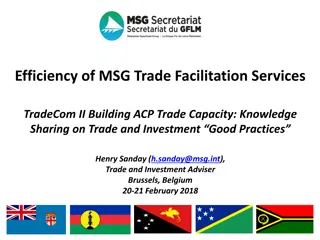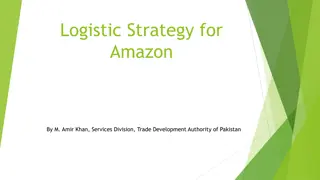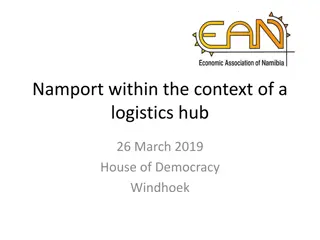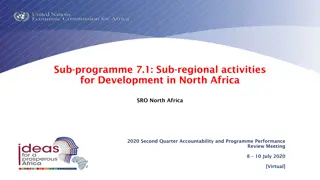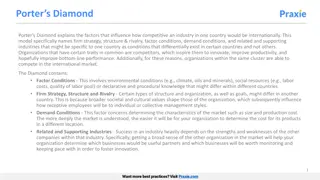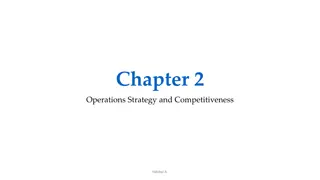Logistics Initiatives for Trade Competitiveness in Africa
Explore a presentation on logistics initiatives by Jean Kizito Kabanguka focusing on transportation costs, trade competitiveness, and challenges faced by landlocked countries. Discover insights on logistics processes, transport corridors, and recommendations to enhance trade facilitation in Africa.
Download Presentation

Please find below an Image/Link to download the presentation.
The content on the website is provided AS IS for your information and personal use only. It may not be sold, licensed, or shared on other websites without obtaining consent from the author. Download presentation by click this link. If you encounter any issues during the download, it is possible that the publisher has removed the file from their server.
E N D
Presentation Transcript
Corridor Logistics Initiatives Jean Kizito Kabanguka
In this presentation. Introduction Logistics Costs vs Trade Competitiveness Landlocked Countries Vs Transit Corridors Logistics Cost and Delays Transport Observatories Conclusions - Recommendations
Introduction Logistics Costs Transport Costs Transport Prices (Tariffs) Transport Corridor Types of Corridors Transport Multimodal Transport Intermodal Trade Transport Facilitation Trade liberalization Few Definitions
Logistics Costs Vs Trade Competitiveness Globalization changes the environment within which manufacturing companies compete. Ability to bring products continuously and effectively to the market: Management of logistics processes. Logistics processes : Management of movement and storage of goods among the different members of the supply chain and across international borders. Corridor Logistics costs: Sequence of transit operations with the following components
Landlocked Countries Vs Transport Corridors Landlocked is based on the idea of dependence over the transit state, Tyranny of distance : which implies high transaction costs Mitigating measures for landlocked countries result of two set of actions: Developing a legal framework in treaties and regional agreements Developing regional transport infrastructure. Transport prices in Africa remain the highest in the world Transaction costs in general remain very heavy Most regional transit agreements not Implemented
Landlocked Countries Vs Transport Corridors Transit time in ports Border delays at main crossings Lack of computerization or deficiencies in IT connections; Infrastructure (intermodal interfaces, roads and rail condition, missing links, etc.); Modal Split and Trade Imbalance Lack of enforcement of harmonized regulation Delays incurred due to lengthy documentation and cargo clearance procedures Trade and Transport Facilitation Constraints
Logistics Cost and Delays High Transport Cost Freight tariff USD per Ton/km USA 0.02 USD par T/Km, Kenya 0.04 per T/Km, Uganda 0.085 per T/Km, Rwanda 0.090 per T/Km Niger 0.13 per T/Km Congo DRC 0.12 per T/Km Burundi 0.11 per T/Km Burkina Faso 0.09 per T/Km Transaction Costs (Freight as % of value of imports) 8% en Europe, 11% en Afrique, 30% Afrique de l Est, 35 % - 40% Rwanda, Burundi, Est de la RDC
Logistics Cost and Delays Developing countries 9 Least developed countries 17 Landlocked countries 14 Zimbabwe 16 Zambia 17 Uganda 36 Swaziland 3 Rwanda 48 Mali 36 Malawi 56 Lesotho 15 Ethiopia 25 Chad 52 Central African Republic 33 Burundi 24 Burkina Faso 26 Botswana 8 0 10 20 30 40 50 60 Transit Costs (% Exports)
Logistics Cost and Delays Delays along Selected Corridors (days) TOTAL Port Trans Port sec Frontiere Transport Destin. Fin. Douala Ndjamena 24 39 8 8 3 Mombasa Kampala 21 13 4 1 1 2 Dar ES Kampala 27 17 5 2 1 2
Logistics Cost and Delays Uncertainties ( Ports Mombasa) 160 140 120 100 30+ 80 60 40 20 0 1 3 5 7 9 11 13 Transit Time (Days) 15 17 19 21 23 25 27 29 14
Transport Observatories SSATP DP 2 and Observatories Past Experiences Northern Corridor UEMOA Corridors Current Status CICOS Corridor Central and Dar Corridor Northern Corridor West Africa Corridors Partnership Framework Which indicators? Data sources Existing computerized information Dedicated surveys where information is inadequate or missing
Transport Observatories Volume Time Price Quality Corridor Total transit Total transit time Total price Country Border counts Border crossing delays, etc. Road network, Customs fraud, etc. Port traffic, rail activity, etc. Port dwell time Tariffs Fleet (rail, road), annual mileage, etc.. Modes Nodes
Transport Observatories Observatories can supply many of the data requested, Extend/compare facilitation measures across the continent to benchmark and look at best/good practices The Corridor Performance Monitoring cannot be useful tools without Effective and Integrity Data Collection Critical analysis Wide distribution of the report generated On regular basis, need to update the benchmark in order to cope with the Corridor Performance situation
Conclusion Transit Transport Constraints it is not just the poor quality of physical infrastructure, Non implementation of regional trade facilitation instrument is an issue More regulatory reform and harmonization is required to drive down the cost of trade As regions become more integrated, regulation should pass on to regional regulatory bodies Appropriate mechanisms for stakeholder involvement Effective transit agreements Increasing regional integration and trade is vital to the competitiveness of Africa in the global market
Thank You www.worldbank.org/afr/ssatp www.ssatp.org


